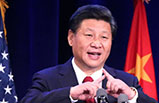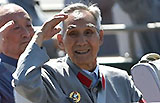Russia-Japan territorial row flares up
(Xinhua) Updated: 2012-07-04 14:10MOSCOW - Russian Prime Minister Dmitry Medvedev has braved both unpredictable weather and quite predictable reactions from Tokyo by visiting for the second time the disputed Southern Kuril archipelago in the Far East.
Analysts here say his trip on Tuesday to Kunashir (called Kunashiri in Japan) islet whipped up a new round of diplomatic spats between Russia and Japan, but bilateral relations will continue developing as contacts and exchanges between the two parties have not stopped.
Demonstration of flag
Medvedev was about to cancel his visit to the islet on Monday due to stormy Pacific weather but a sudden lull allowed him to complete the planned trip on Tuesday.
Japan, as expected, summoned Russian Ambassador to Japan Yevgeny Afanasyev and "demanded explanations" over the trip just a few minutes after Medvedev's plane landed on Kunashir Island.
Tensions mounted in November 2010 when Medvedev, then president of Russia, visited the resource-rich islands, which are surrounded by rich fishing grounds, oil wells, natural gas and rich mineral deposits - all keenly vied for by both countries. He was the first Russian leader to visit the disputed islands.
This time the scenario was hardly any different: Medvedev's second trip to the Kurils created a strong sense of deja vu.
Local analysts said Medvedev's latest visit was sort of "flag demonstration."
Sergey Lusianin, professor of Moscow's Foreign Affairs Institute, said Russia seemed to drop its earlier line of trading the two islands out of four in exchange for a peace treaty with Tokyo.
"Russia now considers such a deal unfavorable," the expert said.
Medvedev's few words upon setting off delivered the same message, in which he called the islands "important parts of Russia" and vowed to continue the visit by government officials in future.
"Moscow wants to demonstrate that the long-time closed vast region has now been opened for the world. On the other hand, Moscow shows to Tokyo that Russia is not going to bargain over the isles any more," Lusianin said.
"Frequent visits of federal officials to the Far East show that Russia has decided to deal with Japan with no peace treaty at all for an indefinitely long time. For Russia, it is a luxury to postpone the region's development in anticipation of some uncertain agreement," Lusianin said.
Angry words in front, quiet contacts at backyard
Moscow and Tokyo have been at odds over the four isles (known as the Northern Territories in Japan) since the end of World War II, when the Soviet Union seized the disputed isles, including Etorofu, Kunashir, Shikotan and the Habomai islet group, with 17,000 residents.
Despite diplomatic tit-for-tat wrangling over the territories, quiet contacts have not really halted as both sides are perfectly aware that rows can change nothing in their actual relations and they have to push forward their ties.
Last week, amidst another exchange of the diplomatic notes on the eve of Medvedev's visit, Russian Chief of Staff Nikolai Makarov and visiting Japanese counterpart Sigeru Iwasaki said they were satisfied with the current military cooperation between the countries.
Russian Foreign Minister Sergei Lavrov said on Tuesday that a peace treaty is not resulted from periodical protests but from implementation of agreements reached by leaders of the two nations.
Lavrov hoped to meet his Japanese counterpart soon this month to further advance bilateral cooperation.
Leonid Kalashnikov, first deputy chairman of the State Duma Committee on International Affairs, suggested that the dispute be solved via Japan's efficient participation in Russia's economic development.
"It is a well-known fact that Japanese specialists are working with Russia on oil and gas production in Sakhalin. There would be a lot of work for the Japanese to do on the shelf off Kurils and on the islands proper, should they wish to cooperate with the Russians more closely," Kalashnikov told local media.






